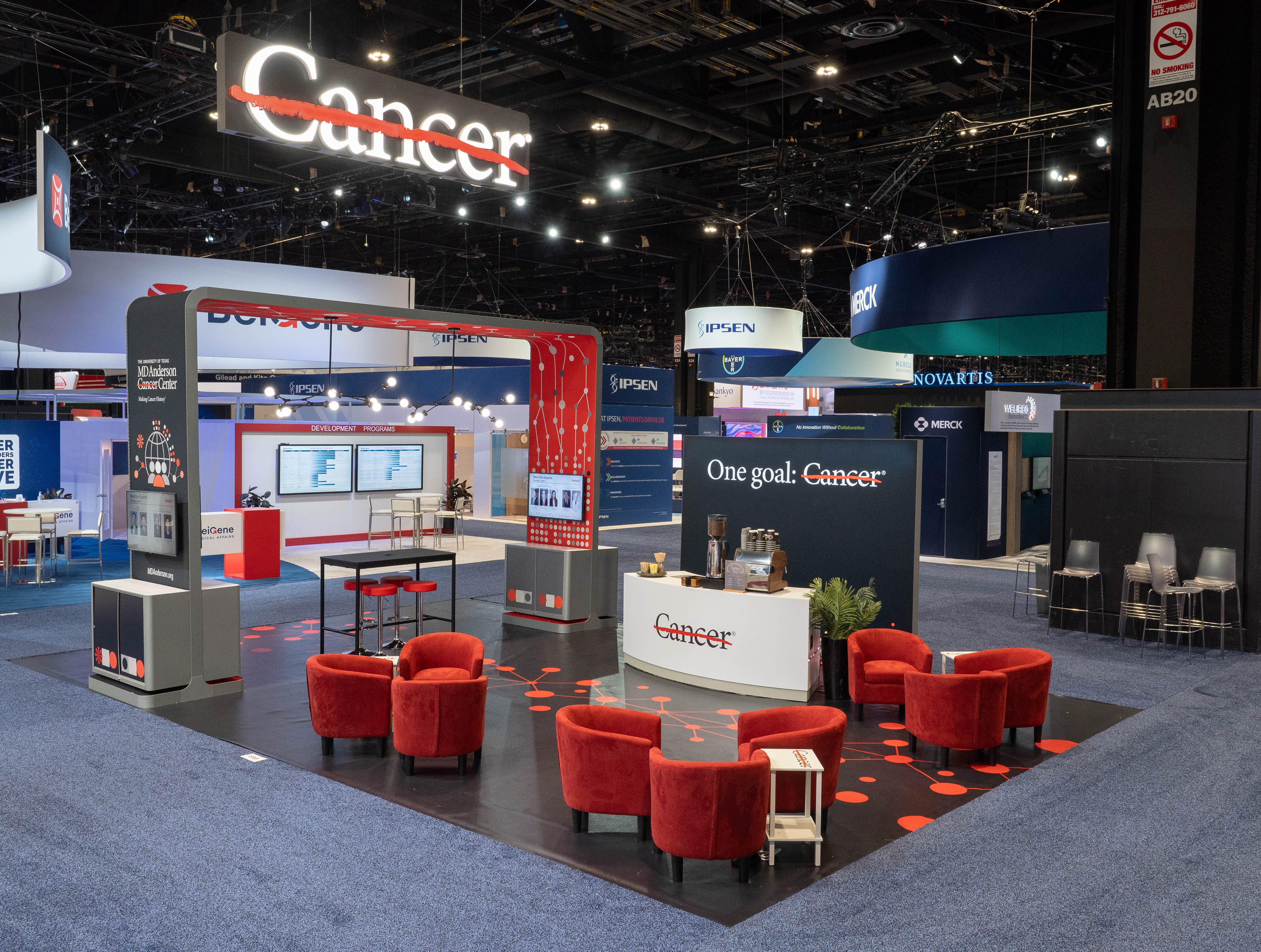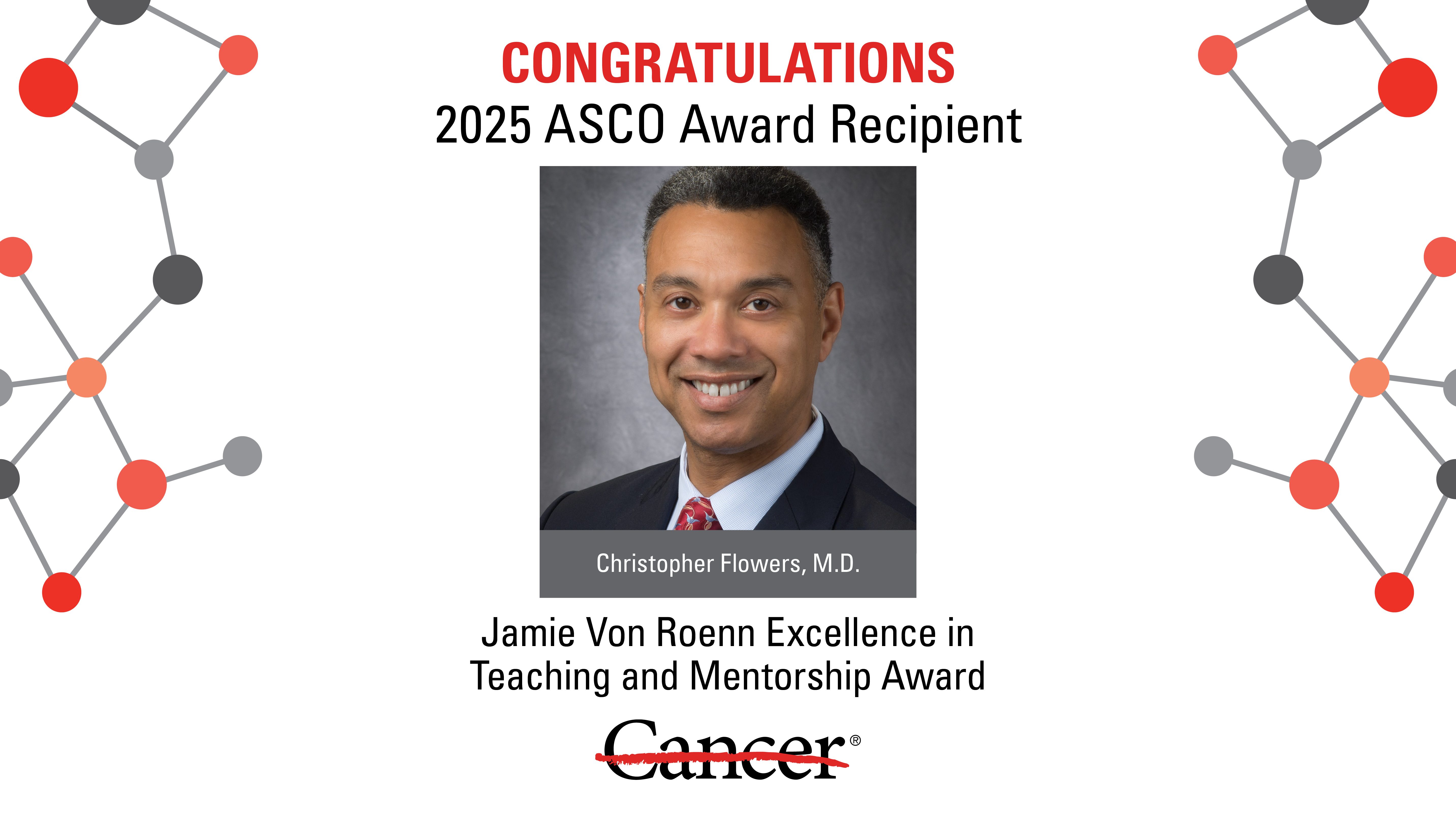At MD Anderson, we work in partnership with our patients to enable groundbreaking research to better prevent, diagnose and treat cancer. Grounded in a culture of collaboration, connectivity and data-based science, our research yields transformative findings that are shifting patient care and improving patients’ lives across the globe.
At the ASCO® Annual Meeting, our experts will showcase their pacesetting research and join colleagues for discussion on the latest advances in oncology.
Below are highlights from our presentations, details about onsite networking opportunities with our experts and information on open positions at MD Anderson.
Featured Articles

Meet the Experts
Visit MD Anderson at Booth 10059 to network with us, to ask a question, to learn about training and career opportunities and to continue the conversation on key presentations with our experts.
Exhibit Hall Hours
- Saturday, May 31: 9 a.m.–5 p.m.
- Sunday, June 1: 9 a.m.–5 p.m.
- Monday, June 2: 9 a.m.–5 p.m.
Barista-crafted coffee available at the booth during all hours of the exhibit hall.
Saturday, May 31
10–10:30 a.m. CT
Revealing the risk: Insights on hereditary cancers

Banu Arun, M.D.
Professor, Breast Medical Oncology

Abenaa Brewster, M.D.
Professor, Clinical Cancer Prevention

Julie Moskowitz
Genetic Counselor
11–11:30 a.m. CT
A new era for pediatric cancer clinical trials

Najat Daw, M.D.
Professor, Pediatrics

Michael Roth, M.D.
Professor, Pediatrics
11–11:30 a.m. CT
Partnering with health systems to eliminate cancer

Daniel Johnson, M.D.
Ochsner MD Anderson Cancer Center

Michael Overman, M.D.
Associate Vice President of Research, MD Anderson Cancer Network

Naveen Pemmaraju, M.D.
Executive Director, Cancer Medicine, Cancer Network

Helen Ross, M.D.
RUSH MD Anderson Cancer Center

Matthew Ulrickson, M.D.
Banner MD Anderson Cancer Center

Lei Zheng, M.D., Ph.D.
UT Health San Antonio MD Anderson Cancer Center
11:30 a.m.–noon CT
Rare cancers: Defining the gold standard of care, Part I

Naveen Pemmaraju, M.D.
Director, Leukemia for Cancer Network
11:30 a.m.–noon CT
Innovations in breast cancer treatment

Fumiko Chino, M.D.
Assistant Professor, Radiation Oncology Department
12:30–1 p.m. CT
Clinical Trials at MD Anderson

Christopher Flowers, M.D.
Division Head, Cancer Medicine

Jennifer Litton, M.D.
Vice President, Clinical Research
Professor, Breast Medical Oncology
12:30–1 p.m. CT
Spotlight on sarcoma

Ryan Denu, M.D., Ph.D.
Fellow

Elise Nassif Haddad, M.D., Ph.D.
Assistant Professor, Sarcoma Medical Oncology

Vinod Ravi, M.D.
Professor, Sarcoma Medical Oncology
1–1:30 p.m. CT
MD Anderson’s approach to whole-patient care

Ryan Huey, M.D.
Assistant Professor, Gastrointestinal Medical Oncology

Terri Woodard, M.D.
Professor, Gynecologic Oncology and Reproductive Medicine
2–2:30 p.m. CT
New horizons in lung cancer treatment

Eric Singhi, M.D.
Assistant Professor, General Oncology and Thoracic/Head and Neck Medical Oncology

Ferdinandos Skoulidis, M.D., Ph.D.
Associate Professor, Thoracic/Head and Neck Medical Oncology

Natalie Vokes, M.D.
Assistant Professor, Thoracic/Head and Neck Medical Oncology
3:15–3:45 p.m. CT
Training at MD Anderson: Investigational Cancer Therapeutics Fellowship

Sarina Piha-Paul, M.D.
Professor, Investigational Cancer Therapeutics
Sunday, June 1
10–10:30 a.m. CT
The next era in colorectal cancer management

S. Daniel Haldar, M.D.
Assistant Professor, Gastrointestinal (GI) Medical Oncology

Scott Kopetz, M.D., Ph.D.
Professor, Gastrointestinal (GI) Medical Oncology
Noon–12:30 p.m. CT
Emergent targeted therapies for high-risk B-cell
malignancies

Krina Patel, M.D.
Associate Professor, Lymphoma/Myeloma

Michael Wang, M.D.
Professor, Lymphoma and Myeloma

Jason Westin, M.D.
Professor, Lymphoma and Myeloma
1–1:30 p.m. CT
Innovative approaches to head and neck cancers

Neil Gross, M.D.
Professor, Head and Neck Surgery

Katherine Hutcheson, Ph.D.
Professor, Head and Neck Surgery
2:15–2:45 p.m. CT
Rare cancers: Defining the gold standard of care, Part II

Van Morris, M.D.
Associate Professor, Gastrointestinal Medical Oncology
3–3:30 p.m. CT
Anaplastic thyroid: The evolving role of targeted therapies

Sarah Hamidi, M.D.
Assistant Professor, Endocrine Neoplasia and Hormonal Disorders

Anastasios Maniakas, M.D., Ph.D.
Assistant Professor, Head and Neck Surgery

Mark Zafereo, M.D.
Professor, Head and Neck Surgery
Monday, June 2
9–9:30 a.m. CT
Designing clinical trials for new targets, Part I

Timothy Yap, M.B.B.S., Ph.D.
Vice President, Head of Clinical Development, Therapeutics Discovery Division
Professor, Department of Investigational Cancer Therapeutics
9–9:30 a.m. CT
Accelerating drug discovery with AI

Caroline Chung, M.D.
Director of Data Science Development and Implementation, Institute for Data Science in Oncology
Chief Data Officer, Vice President for Data Impact and Governance

Timothy Heffernan, Ph.D.
Vice President, Oncology Research
10:30–11 a.m. CT
The power of pathology

Lei Huo, M.D., Ph.D.
Professor, Anatomical Pathology

Lavinia Middleton, M.D.
Professor, Pathology
Noon–12:30 p.m. CT
Metastatic melanoma and immunotherapy: What’s next?

Rodabe Amaria, M.D.
Professor, Melanoma Medical Oncology

Elizabeth Burton, Ph.D.
Executive Director, Strategic Translational Research Initiative Development

Jennifer McQuade, M.D.
Associate Professor, Melanoma Medical Oncology

Hussein Tawbi, M.D., Ph.D.
Professor, Melanoma Medical Oncology
1–1:30 p.m. CT
The shifting gynecologic cancers landscape

Shannon Westin, M.D.
Professor, Gynecologic Oncology and Reproductive Medicine
2:30–3 p.m. CT
New approaches to prostate cancer

Ana Aparicio, M.D.
Professor, Genitourinary Medical Oncology

Andrew Hahn, M.D.
Assistant Professor, Genitourinary Medical Oncology
4:30–5 p.m. CT
Designing clinical trials for new targets, Part II

Cathy Dumbrava, M.D.
Assistant Professor, Investigational Cancer Therapeutics

David Hong, M.D.
Professor, Investigational Cancer Therapeutics
Our research by the numbers
$1.3B
invested in research
1,556
clinical trials
188
patents awarded
From Sept. 1, 2023 to Aug. 31, 2024
Why Houston?

As America's fourth-largest city, Houston has a lot to offer. Find out why Houston is a hub for scientific and medical excellence.
Education and Training at MD Anderson
MD Anderson academic programs are competitive and comprehensive. We offer educational opportunities from undergraduate degrees to graduate medical education opportunities.
The MD Anderson Radiation Quality Assurance Laboratory
The MD Anderson Radiation Quality Assurance Laboratory (RQA Lab) is a specialized service designed to meet the needs of the great oncology community by ensuring accurate radiation measurements in clinical trials. Our expert team offers a wide range of radiation physics services, including anthropomorphic phantom tests, virtual and onsite audits, contract services and clinical trial quality assurance.
Institutes at MD Anderson
United by a shared mission to end cancer, MD Anderson clinicians and scientists work seamlessly together to advance groundbreaking research that can transform the field of hematology. Leveraging our unique research ecosystem, including three leading institutes, we are pioneering new prevention, diagnostic and treatment approaches to address the most pressing needs for patients with cancer.
James P. Allison Institute
The James P. Allison Institute is dedicated to advancing exceptional discovery, translational and clinical research to integrate immunobiology across disciplines and unlock the full potential of science and medicine for human health. The institute builds upon the legacy of its namesake, James P. Allison, Ph.D., who was awarded the 2018 Nobel Prize in Physiology or Medicine for his fundamental discoveries in T cell biology and his invention of ipilimumab, the first immune checkpoint inhibitor to treat cancer.
Institute for Cell Therapy Discovery & Innovation
Building upon unparalleled expertise, MD Anderson’s Institute for Cell Therapy Discovery & Innovation is leading the world in developing and advancing impactful cell therapies for patients in need. By uniting the top minds in the field to lead exceptional fundamental, translational and clinical research, we're focused on creating breakthrough off-the-shelf therapies that can be readily adapted for both hematologic and solid tumors as well as devastating auto-immune conditions, infections and other diseases.
Learn more about the Institute for Cell Therapy Discovery & Innovation
Institute for Data Science in Oncology
The Institute for Data Science in Oncology (IDSO) integrates the tremendous power of meaningful data extraction and interpretation with MD Anderson’s unparalleled scientific and clinical expertise to transform research and care to impact patients.


